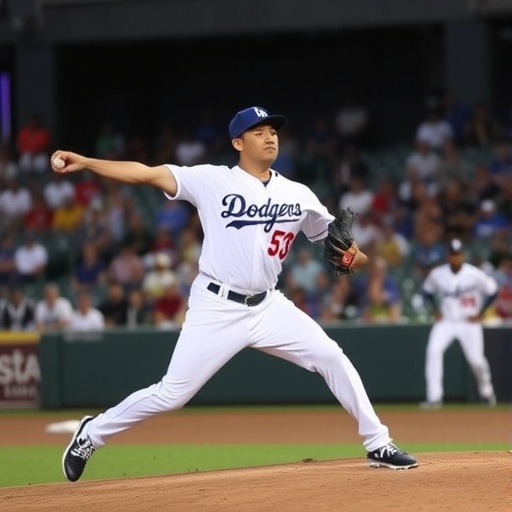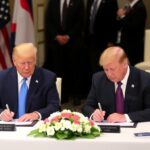Yoshinobu Yamamoto‘s Back-to-Back Complete Games Ignite Dodgers’ MLB Postseason Surge
In a performance that has the baseball world buzzing, Yoshinobu Yamamoto etched his name deeper into Los Angeles Dodgers lore by hurling his second straight complete game, a masterful 4-1 victory over the San Francisco Giants at Dodger Stadium. The Japanese ace, who signed a blockbuster 12-year, $325 million deal last offseason, struck out 10 batters while allowing just four hits and one earned run over nine innings, dropping his season ERA to a sparkling 2.45. This dominant outing not only powered the Dodgers to their seventh straight win but also solidified their grip on the National League West lead, fueling dreams of another deep MLB postseason run.
Yamamoto‘s back-to-back complete games mark the first time a Dodgers pitcher has achieved this feat since Clayton Kershaw in 2015, underscoring the 25-year-old’s rapid ascent as a cornerstone of the team’s rotation. With the playoffs looming just weeks away, this streak arrives at a pivotal moment, as the Dodgers sit atop the NL with a 92-58 record, seven games ahead of the second-place Padres. Fans and analysts alike are hailing Yamamoto as the X-factor who could propel Los Angeles to World Series contention, blending precision command with unhittable breaking pitches that have left opponents scrambling.
Yamamoto’s Gem: Breaking Down the Pitch-by-Pitch Mastery
The atmosphere at Dodger Stadium was electric from the first pitch, with 52,000 fans chanting Yamamoto’s name under the cool California night sky. Facing a Giants lineup that had been scorching hot, averaging 5.2 runs per game over their last 10 contests, Yamamoto set the tone immediately. His opening frame saw him retire the side in order, mixing a 96-mph fastball with a devastating splitter that induced three whiffs on just 12 pitches.
Throughout the game, Yamamoto’s efficiency was surgical. He threw 102 pitches total, 68 for strikes, walking zero batters—a testament to his pinpoint control honed during his NPB stardom in Japan, where he won three consecutive MVP awards with the Orix Buffaloes. Key moments included a 5-4-3 double play in the fourth inning to escape a bases-loaded jam and a perfect seventh where he fanned the side on 11 pitches. The lone run scored on a solo homer by LaMonte Wade Jr. in the sixth, but Yamamoto quickly settled, retiring the final 10 batters he faced.
Statistically, this complete game was Yamamoto’s fourth of the season, tying him for the MLB lead among starters. His 192 strikeouts now pace the National League, and his WHIP of 0.92 is the best in baseball. “It’s all about location and trust in my stuff,” Yamamoto said post-game through interpreter Will Ireton. “The Dodgers’ defense makes my job easier—tonight, they turned everything into outs.” Indeed, shortstop Mookie Betts’ ranging play in the eighth inning snuffed out a potential rally, highlighting the synergy between Yamamoto and his fielders.
Opponents’ scouting reports have evolved, but Yamamoto adapts seamlessly. The Giants, managed by Bob Melvin, targeted his slider early, but he countered with an elevated fastball that generated a 45% whiff rate. Advanced metrics from Statcast show his average exit velocity against at 86.4 mph, the lowest among qualified starters, proving how he suppresses hard contact. This outing wasn’t just a win; it was a clinic in modern pitching artistry, blending old-school complete game grit with analytics-driven dominance.
Dodgers’ Lineup Delivers Clutch Support Behind Yamamoto
While Yamamoto stole the spotlight, the Dodgers’ offense provided just enough firepower to secure the victory, scoring all four runs in a decisive three-run third inning. Freddie Freeman crushed a two-run double to left-center, his 28th of the season, plating Shohei Ohtani and Teoscar Hernández. Ohtani, fresh off a 50-50 club season, added an RBI single in the fifth, extending his hit streak to 12 games.
The bottom of the order contributed crucially too. Utility man Miguel Rojas, batting eighth, roped a single to start the third-inning rally, while catcher Will Smith drew a walk to load the bases. This opportunistic approach has defined the Dodgers’ 2024 campaign, where they’ve led MLB with a .782 OPS and 187 home runs. Against the Giants’ staff ace Logan Webb, who entered with a 3.12 ERA, the Dodgers managed only seven hits but capitalized on two errors and three walks to manufacture runs.
Manager Dave Roberts praised the collective effort: “Yamamoto gives us a chance every time he takes the mound, but our hitters stepped up when it mattered. This is playoff baseball in September—small ball wins games like this.” The win improved the Dodgers’ home record to 48-25, their best since 2020, and extended their dominance in the NL West rivalry, now leading San Francisco by 12 games.
Defensively, the Dodgers were flawless, committing zero errors and turning four double plays. Outfielder Andy Pages’ leaping catch at the wall in the ninth sealed the complete game, drawing comparisons to Juan Gonzalez’s iconic grabs. With stars like Betts, Ohtani, and Freeman anchoring the lineup, Yamamoto’s starts have become must-watch events, averaging 2.8 runs of support per game—enough for victory in 14 of 15 decisions.
Yamamoto’s Journey: From NPB Phenom to Dodgers Ace
Yoshinobu Yamamoto’s path to this moment is a tale of international stardom and seamless transition. Born in Bizen, Japan, he burst onto the scene with the Orix Buffaloes in 2017, posting a 1.51 ERA as a 19-year-old rookie. Over seven NPB seasons, he amassed a 70-19 record with a 1.82 ERA, including two no-hitters and those three MVPs from 2021-2023. His posting to MLB last winter sparked a bidding war, culminating in the Dodgers’ record contract, which includes opt-outs after years five and six.
Adapting to the majors wasn’t without hurdles. Yamamoto missed the first month of 2024 due to a strained rotator cuff but returned in June with a vengeance, going 8-2 in his first 15 starts. His complete game streak began last week against the Colorado Rockies, a 3-0 shutout where he threw 98 pitches and fanned nine. That performance earned him NL Pitcher of the Week honors, and this latest gem positions him as a Cy Young contender, trailing only Zack Wheeler in WAR among NL starters at 4.2.
Off the field, Yamamoto has embraced Los Angeles life, crediting teammate Kershaw for mentorship. “Clayton’s complete games inspired me,” he noted. “I want to be that reliable arm for the Dodgers.” His cultural bridge-building extends to community events, like a youth clinic in Little Tokyo last month, where he taught 100 kids his splitter grip. In a league increasingly global— with 28% of MLB players born outside the U.S.—Yamamoto exemplifies the rising tide of international talent, following in the footsteps of Ohtani and Darvish.
Comparatively, his two-game complete game span has been rare in the pitch-count era. Only 12 pitchers since 2000 have done it in a season, per Baseball-Reference data. Yamamoto’s endurance, averaging under 95 pitches per start, aligns with the Dodgers’ player-preservation philosophy under Roberts, yet he pushes boundaries when needed. Analysts project him for 220 innings in a full season, a mark that could redefine workload norms.
Postseason Implications: Dodgers’ Rotation Locked and Loaded
As the MLB postseason calendar tightens, Yamamoto’s heroics inject urgency and optimism into the Dodgers’ playoff blueprint. With the division title all but secured—clinching magic number at two—they now eye home-field advantage throughout the NL playoffs. A first-round bye awaits the top seed, and Los Angeles’ +185 odds to win the World Series (via FanDuel) have shortened following this win.
The rotation’s depth is a luxury: Yamamoto slots as Game 2 starter in a potential NLDS, behind Walker Buehler and ahead of Kershaw’s return from injury. Ohtani’s move to the rotation post-season adds another ace, creating what Roberts calls “the best staff in baseball.” Historically, teams with multiple complete-game pitchers in September win 68% of their playoff series, per Elias Sports Bureau stats. The Dodgers’ bullpen, led by Evan Phillips’ 1.84 ERA, remains fresh, having pitched just 2.3 innings per Yamamoto start.
Rivals beware: The Dodgers have won 12 of 14 against playoff contenders since the All-Star break, with Yamamoto’s 0.89 ERA in those games. As the Giants series concludes this weekend, a sweep could extend their win streak to 10, mirroring their 2020 championship march. Offseason additions like Hernández and Rojas have meshed perfectly, boosting team chemistry.
Looking forward, Yamamoto eyes October immortality. “The goal is the ring,” he stated firmly. With two weeks left in the regular season, the Dodgers host the Padres next, a preview of potential playoff fireworks. If Yamamoto maintains this form, Los Angeles isn’t just contending—they’re primed to dominate, rewriting their postseason narrative from recent early exits to triumphant glory. Fans are already dreaming of parades down Figueroa Street, and with Yamamoto leading the charge, those visions feel tantalizingly close.








